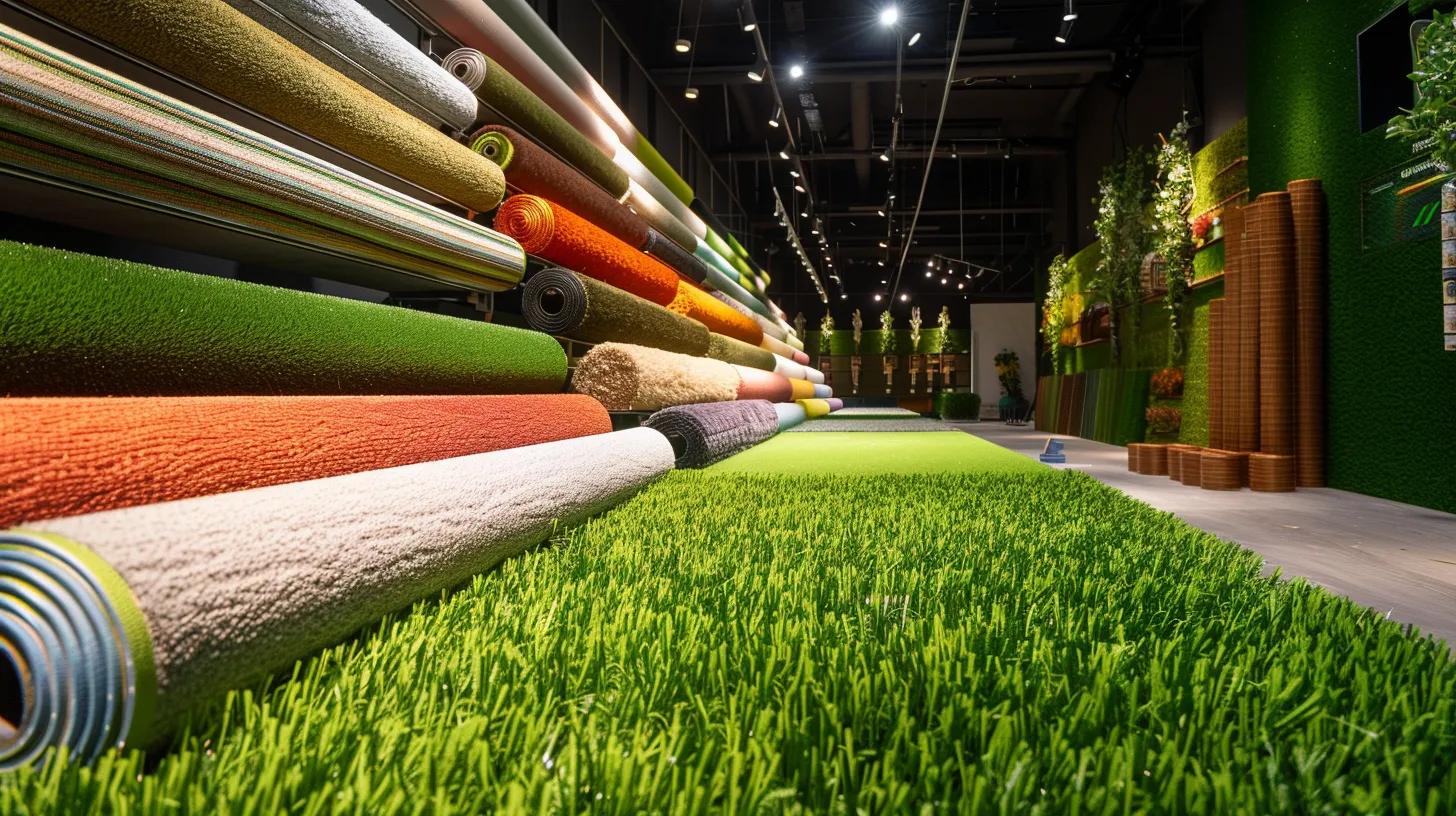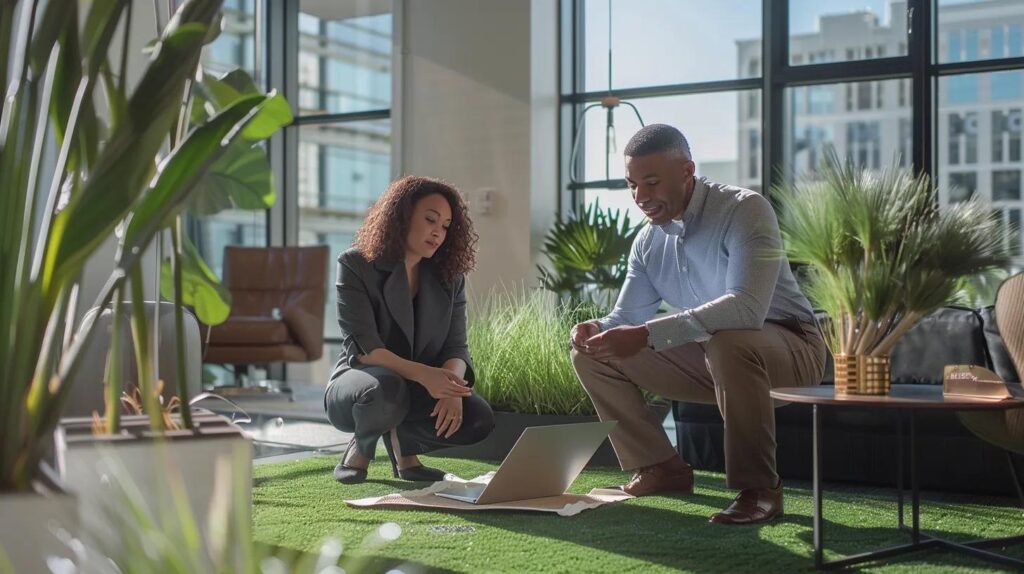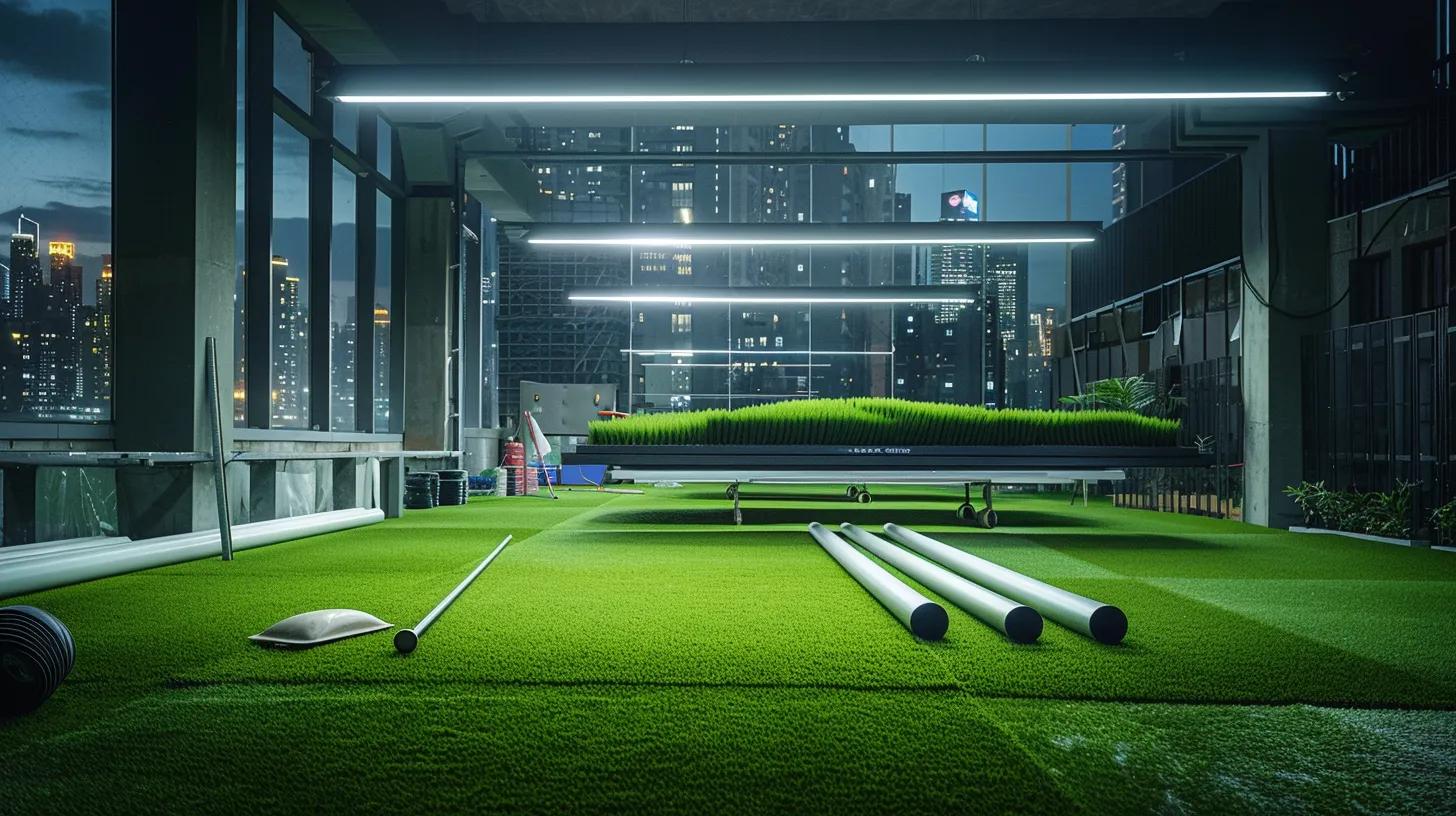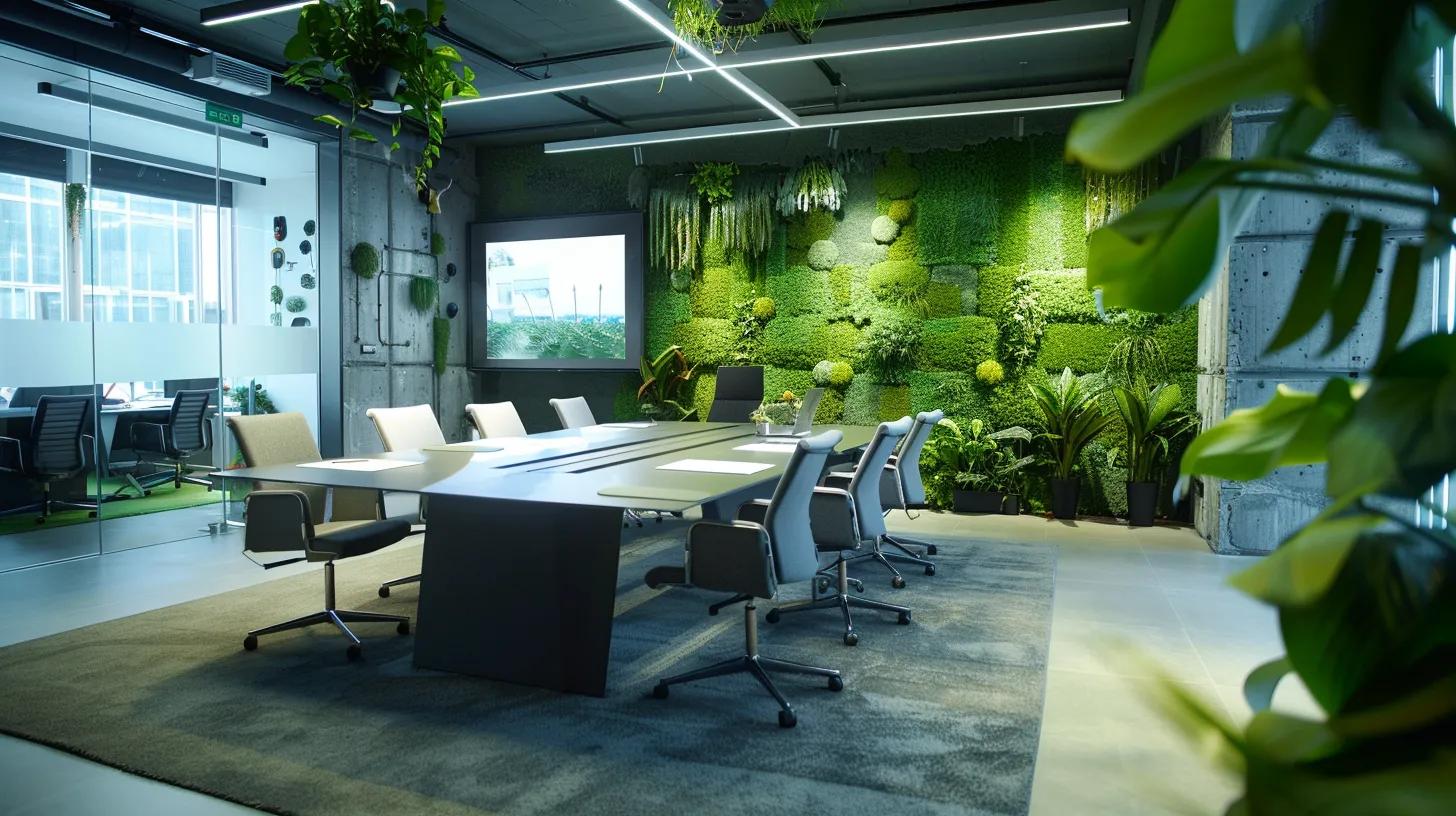
In today’s market, wholesale artificial turf revolutionizes landscaping projects while supporting water conservation and sustainability. As an experienced distributor and installer with over a decade of serving homeowners and commercial clients in Arizona, Utah, and New Mexico, I’m excited to share details about the types of synthetic grass available for wholesale purchase and our installation services. Our approach is built on quality, durability, and customer satisfaction.
Several distinct types of wholesale artificial turf cater to various applications. Each type is designed with specialized features to meet the needs of homeowners, landscapers, and commercial projects.
Landscape turf is engineered with dense, natural-looking blades that mimic real grass. Its typical features include UV stability, realistic color, and a soft texture that enhances curb appeal while withstanding heavy foot traffic. It offers excellent drainage and is ideal for residential lawns, commercial landscaping, and public spaces. Often, a supportive backing improves stability and longevity, ensuring that the turf stays vibrant even in harsh weather conditions.
Pet turf is formulated specifically for pet owners. It features enhanced durability, antimicrobial properties, and an easy-to-clean design. The backing and material are constructed to handle pet waste efficiently, preventing odors and stains. With additional drainage capabilities and a resilient surface, pet turf is ideal for households with active pets that demand a sturdy yet visually appealing surface.
Sports turf is manufactured to meet the rigorous performance standards required by athletic facilities. It offers excellent shock absorption, traction, and durability to sustain heavy, repetitive usage. The dense, shock-absorbent design minimizes contact injuries and ensures consistent ball behavior. Whether used for baseball batting cages, soccer fields, or multi-use sports arenas, sports turf provides a high-performance play surface that withstands varying weather conditions and extensive use.
Commercial turf is designed for extensive projects such as shopping centers, parking lots, and office complexes. Its key features include scalability, ease of installation, and long-term durability. Typically available in large rolls, commercial turf is engineered to handle high foot traffic, vehicular load, and diverse environmental conditions. Advanced drainage features and a guaranteed lifespan make it a cost-effective solution for large-scale applications while maintaining attractive aesthetics and low maintenance costs.

Understanding wholesale turf pricing is crucial for managing landscaping budgets effectively. Prices are determined by a range of factors that influence the overall value and performance of the turf.
Pricing for wholesale artificial turf depends on raw material quality, manufacturing processes, and features such as UV stability, drainage properties, and pile density. Supplier logistics, order volume, and market demand also significantly affect prices. Turf products that offer enhanced durability and a natural finish typically command higher prices, though they provide better long-term performance. Regional market conditions and shipping costs further influence the pricing of bulk orders.
Businesses can realize savings by comparing the unit cost at varying volume levels. Suppliers often provide tiered pricing discounts based on order size. By calculating the cost per square foot and multiplying it by the total area required, businesses can identify significant savings. For example, ordering 10,000 square feet may reduce the cost per square foot by approximately 15% compared to a smaller order, ensuring that larger projects benefit from economic price reductions.
Competitive pricing requires thorough market research. Reputable suppliers like ArTURFicial Wholesale in Phoenix, AZ, are known for consistently offering value, quality, and strong customer service. Comparing multiple vendors, attending landscaping trade shows, and reviewing online feedback can help pinpoint the best options. Competitive offers often include flexible payment terms, warranties, and sometimes free same-day delivery in specific areas.
Synthetic grass provides benefits beyond appearance. It supports water conservation, reduces maintenance needs, and boosts the overall value of landscaping investments.
The foremost benefit of artificial turf is significant water conservation. Replacing natural grass with synthetic alternatives can reduce water consumption by up to 90%, eliminating the need for regular irrigation. This supports sustainability initiatives, especially in water-scarce regions like Arizona. Additionally, many artificial turfs are produced using recycled materials, reinforcing their eco-friendly profile and contributing to overall environmental sustainability.
Synthetic grass requires minimal maintenance compared to natural grass. There is no need for mowing, watering, fertilizing, or pest control. Routine cleaning and occasional brushing are sufficient to keep the turf looking fresh. Reduced upkeep not only extends the turf’s lifespan but also saves time and money for homeowners, making it an attractive option for both residential and commercial applications.
One of the standout advantages of wholesale artificial turf is its durability. High-quality synthetic grass can last between 15 and 20 years, enduring heavy usage and varying weather conditions. The materials used are engineered to resist UV damage, extreme temperatures, and heavy foot traffic. Combined with warranties from reputable suppliers, this long lifespan adds to the turf’s overall value by reducing the need for frequent replacements.

Professional turf installation services are critical to ensuring the success of any synthetic grass project. They enhance the turf’s overall performance and longevity through expert application and finishing.
The installation process begins with a thorough site assessment that includes measuring the area, preparing the base, and addressing drainage needs. The existing surface is then removed and replaced with a proper sub-base before the synthetic grass is rolled out and securely fixed in place. Infill is applied to keep the blades upright and stable. Final steps include trimming the edges and cleaning the area for a professional finish. All these steps are executed by trained technicians using specialized equipment, which maximizes both the performance and visual appeal of the installation.
Hiring professional installation services ensures a high-quality finish while reducing overall project costs and time. Technicians can complete installations more quickly than a DIY approach and help avoid mistakes that might lead to costly repairs. By providing all necessary materials—such as adhesives, infill, and cutting tools—professionals can minimize downtime and reduce labor costs, especially on large-scale projects.
When selecting turf installers, businesses should prioritize experience, certifications, and customer testimonials. A reputable installation team will have a proven track record with both residential and commercial projects. Evaluating the quality of equipment, range of services offered, and warranty on workmanship provides further assurance. A trusted installer ensures long-lasting results and maximizes the return on investment.
Regular maintenance is key to prolonging the life and appearance of wholesale artificial turf. By following recommended practices, homeowners can ensure that their synthetic grass remains vibrant and functional for years.
Synthetic grass should be cleaned and inspected every three to six months, depending on usage. Light cleaning on a weekly or bi-weekly basis helps remove debris and prevent dirt buildup. Additionally, a thorough inspection should be performed periodically to check for any loose seams, settling infill, or minor damages that could lead to bigger issues over time.
For optimal maintenance, use tools such as a power broom and a leaf blower, along with specialized turf cleaning solutions. A power broom helps reorient the turf fibers for a natural appearance, while a leaf blower effectively removes surface debris. Mild soap and water or specific antimicrobial treatments can be used to maintain the turf’s aesthetic appeal and functionality.
Consistent upkeep is crucial for preventing costly repairs and extending the life of synthetic grass. Regular cleaning, maintaining proper infill levels, and addressing small damages quickly help preserve the turf’s performance and structural integrity. A proactive maintenance plan safeguards both the appearance and functionality of the installation over the long term.

Choosing the right supplier is essential for a successful artificial turf project. The supplier should meet expectations regarding quality, pricing, and customer service to ensure a smooth and efficient process.
When selecting a supplier, ask questions about product quality, warranty terms, and support services. Key questions include: • What is the expected lifespan of your turf products? • Do you offer installation support? • How do you handle product defects? • What are your bulk discount policies? These questions help clarify a supplier’s capabilities and ensure that the product meets both technical and aesthetic requirements.
Product variety and consistent availability are critical, especially for large-scale projects. A reliable supplier should offer a diverse range of products—from pet turf and sports turf to landscape and commercial turf—and have the capacity to deliver replacement materials when needed. This indicates the supplier’s strong market presence and commitment to quality.
Customer support is a vital aspect of wholesale turf purchasing. Effective customer support provides assistance with installation, troubleshooting, and maintenance. It can also include technical guidance, warranty services, and flexible delivery options. A responsive support team ensures the purchasing process is smooth and that any issues are resolved quickly.
The market for wholesale artificial turf continuously evolves with technological and sustainable innovations. Staying informed about these trends helps in making educated decisions for your turf projects.
Recent technological advances have significantly enhanced both the quality of artificial turf and the installation process. Automated cutting tools, precision measuring systems, and advanced infill materials streamline installation, improve drainage systems, and even contribute self-cleaning properties. These innovations result in more efficient installations with less waste and more consistent, durable outcomes for end users.
Sustainability is a major driving force in product development. Many suppliers now produce turf using recycled materials, reducing environmental impact. Additionally, synthetic grass conserves water—a critical benefit in dry areas like Arizona. Reduced energy inputs during manufacturing and designs that enable end-of-life recycling further strengthen the eco-friendly appeal of these products.
Rising demand for synthetic turf has led to market expansion, increased competition, and better pricing structures through economies of scale. While seasonal fluctuations and supply chain challenges may affect availability, establishing strong relationships with reliable suppliers helps ensure competitive prices and consistent product quality.
Before diving into the final insights, let’s review a table summarizing the key attributes of various artificial turf types.
| Turf Type | Key Features | Primary Benefit | Ideal Application |
|---|---|---|---|
| Landscape Turf | Natural look, UV stability, soft texture | Enhances curb appeal; low maintenance | Residential lawns, commercial landscaping |
| Pet Turf | Enhanced drainage, antimicrobial, durable | Easy to clean; withstands pet use | Pet-friendly yards, dog parks |
| Sports Turf | Shock absorption, high density, traction | Improved athletic performance | Athletic fields, batting cages |
| Commercial Turf | Scalable sizes, long-lasting, robust design | Cost-effective for large areas | Shopping centers, office parks |
This table provides a quick reference to help you compare and select the right type of artificial turf for your project based on its features, benefits, and ideal applications.
Q: How do I decide which type of artificial turf is best for my home? A: Consider your primary needs. For pet owners, pet turf is ideal; for those prioritizing aesthetics and low maintenance, landscape turf is a strong choice. Evaluate your environmental conditions and intended usage to determine the best option.
Q: How long does artificial turf typically last? A: High-quality synthetic grass usually lasts between 15 to 20 years. The actual lifespan depends on maintenance, installation quality, and local environmental factors. Regular care and proper installation can extend its life significantly.
Q: Can synthetic grass help me save money on water bills? A: Yes. By eliminating the need for regular watering, synthetic grass can reduce water consumption by up to 90%, offering substantial savings in areas with water restrictions or drought conditions.
Q: What maintenance is required for artificial turf? A: Maintenance is minimal, typically involving periodic cleaning, infill top-ups, and routine inspections to ensure the turf remains in top condition.
Q: Why should I choose a wholesale supplier over a retail option? A: Wholesale suppliers offer competitive pricing for bulk orders, a wider variety of products, and specialized customer support for large-scale projects, ultimately reducing project costs.
Q: Are there any warranties available for artificial turf products? A: Yes. Reputable suppliers typically provide warranties covering product defects and durability, adding extra value and assurance to your investment.
Q: How do professional installation services benefit me? A: Professional installers ensure the proper preparation of the site, efficient installation, and high-quality finishing. Their expertise minimizes errors, reduces installation time, and prevents costly repairs.
Q: What sustainability benefits does artificial turf offer? A: Artificial turf greatly reduces water usage and is often made from recycled materials. It eliminates the need for pesticides and minimizes ongoing maintenance energy, making it an environmentally friendly choice.
By understanding these detailed aspects of wholesale artificial turf solutions—from product types and pricing factors to installation best practices and maintenance tips—you can make well-informed decisions that enhance the beauty, efficiency, and sustainability of your outdoor spaces. Whether you’re planning a complete backyard overhaul or a commercial landscaping project, the benefits of synthetic grass are clear. Use this guide to navigate the market, choose the right supplier, and enjoy a beautiful, hassle-free landscape that stands the test of time.
wholesale turf solutions, wholesale artificial turf tempe
Landscape turf from Arturficial Wholesale offers a natural-looking, UV-stable solution that enhances the curb appeal of any residential or commercial property. Its soft texture and vibrant colors create a lush, inviting outdoor space that requires minimal maintenance.
Arturficial Wholesale's landscape turf is designed to withstand heavy foot traffic while maintaining its pristine appearance, making it an ideal choice for both residential lawns and commercial landscaping projects.
Pet owners can enjoy the benefits of artificial turf with Arturficial Wholesale's specialized pet turf. This durable, antimicrobial option features enhanced drainage and easy-to-clean properties, ensuring a comfortable and hygienic outdoor space for furry friends.
Arturficial Wholesale's pet turf is specifically engineered to withstand the demands of pet-friendly environments, providing a safe and long-lasting solution for backyards, dog parks, and other pet-focused areas.
For athletic fields, batting cages, and multi-use sports arenas, Arturficial Wholesale offers high-quality sports turf. This specialized solution provides superior shock absorption, traction, and durability to ensure a safe and consistent playing surface, even in the face of heavy, repetitive use.
Arturficial Wholesale's sports turf is designed to withstand varying weather conditions and maintain its exceptional performance, making it an ideal choice for sports facilities and recreational spaces.
Arturficial Wholesale's commercial turf is engineered for large-scale projects, such as shopping centers, parking lots, and office complexes. Its scalable sizes, long-lasting durability, and robust design make it a cost-effective solution for extensive outdoor areas.
With Arturficial Wholesale, businesses can enjoy the benefits of a visually appealing and low-maintenance landscape that can handle heavy foot traffic and diverse environmental conditions, all while optimizing their project budgets.